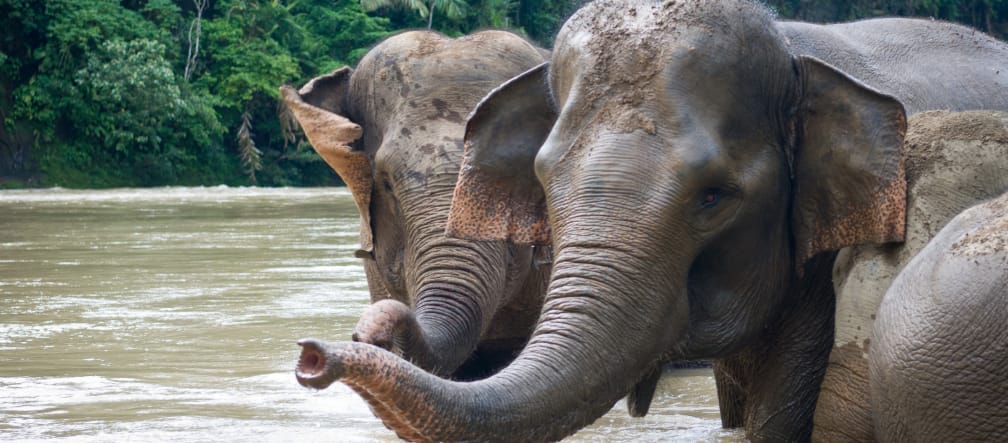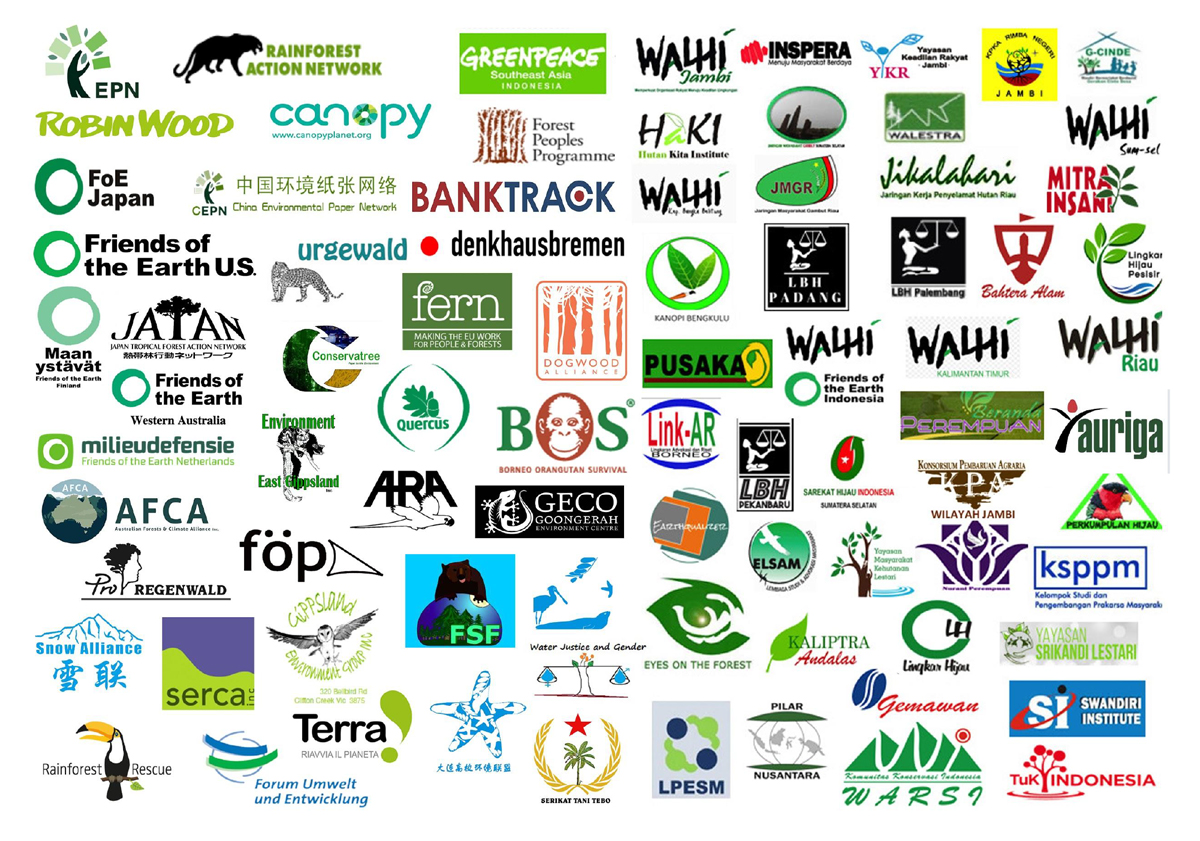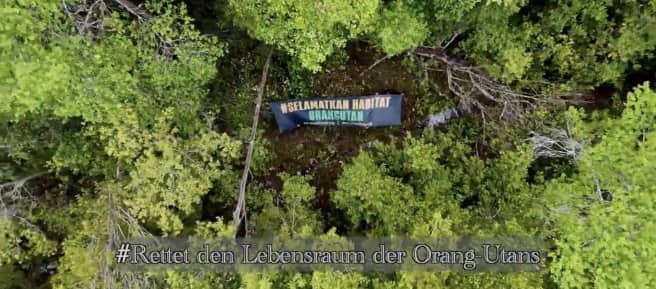
Keine Geschäfte mehr mit dem Papierkonzern APP!
Der indonesische Papierkonzern APP zerstört seit Jahrzehnten Regenwälder und Torfmoore, vernichtet Habitat von Orang-Utans und Tigern und missachtet die Rechte der Bevölkerung. Umweltschützer und Menschenrechtler fordern daher von Investoren und Kunden, die Geschäftsbeziehungen zu APP abzubrechen.
News und UpdatesAn: Investoren und Kunden von APP
„Umwelt- und Menschenrechtsorganisationen erheben schwere Vorwürfe gegen den Papierkonzern APP. Bitte brechen Sie die Geschäftsbeziehungen zu APP ab.“Für den steigenden Papierverbrauch werden tropische Regenwälder abgeholzt und die Flächen von Papier- und Zellstoffkonzernen in Akazien- oder Eukalyptusmonokulturen umgewandelt. Die Branche ist mitverantwortlich für die Zerstörung der Regenwälder, vor allem auf Sumatra. Sie ist in zahlreiche Konflikte mit der lokalen Bevölkerung verwickelt, begleitet von Gewalt, Einschüchterungen und illegalen Machenschaften.
Der indonesische Konzern Asia Pulp & Paper APP ist einer der weltweit größten Produzenten. Hunderte Dörfer liegen laut einem Bericht über die Kartierung von Konflikten (Conflict Mapping) innerhalb der Wälder und Plantagen, für die APP und Tochterfirmen Konzessionen halten. Nichtregierungs--organisationen haben 107 Konflikte über 350.000 Hektar Land dokumentiert. Einer der tragischsten Fälle: Am 4. März 2020 soll die von APP kontrollierte Firma PT Wirakarya Sakti (WKS) mit Drohnen Gift über Felder und Gärten des Dorfes Lubuk Mandarsah gesprüht und somit die Lebensgrundlage der Bevölkerung gefährdet haben. Das Unternehmen bestreitet die Vorwürfe.
2013 stellte APP seine „No-deforestation-policy“ vor, der zufolge kein Primärwald mehr abgeholzt werden durfte. Das Versprechen wird nicht eingehalten. Vielmehr hat APP seine Produktion ausgeweitet. Urwaldholz kommt nun zu 98 Prozent aus Borneo.
Ebenso versprach der Konzern 2013, die Rechte der Bevölkerung zu respektieren, das Prinzip der Freien, Vorherigen und Informierten Zustimmung (FPIC) zu implementieren und soziale Konflikte beizulegen. Bis heute sind die meisten Konflikte ungelöst.
Neunzig Umwelt- und Menschenrechtsorganisationen fordern von Investoren und Kunden, keine Geschäfte mit APP, seinen Tochterunternehmen und Zulieferern zu tätigen, bis es grundlegende Verbesserungen entlang der gesamten Produktionskette gibt.
Stand: 30.4.2024
Hier finden Sie den offenen Brief der neunzig Umwelt- und Menschenrechtsorganisationen im Wortlaut:

Civil Society Open Letter About APP’s Recurrent Violation of Farmers’ Land Rights in Jambi, Indonesia
15 May 2020
Dear Madam/Sir,
We are contacting you about the destruction of community food resources in the village of Lubuk Mandarsah, Tebo Regency, Jambi Province, Indonesia, perpetrated by PT. Wira Karya Sakti (WKS). WKS is an industrial pulpwood producer affiliated with Asia Pulp and Paper Sinar Mas (APP Sinar Mas), one of Indonesian main pulp companies. On the morning of 4 March 2020, a drone sprayed poison on the community’s rubber trees, vegetables, and palm trees. This is the way PT Wirakarya Sakti resolved its conflict with the local community: by jeopardising the safety of their food and livelihood in the middle of the Covid-19 crisis.
This is not the first violation by WKS. In 2015, a farmer union leader, Indra Pelani, engaged in protecting community land, was brutally killed by WKS security.
Back in November 2019, the security team of PT Arara Abadi, another APP supplier, had arrested Pak Bongku, a member of the Sakai indigenous people, for planting sweet cassava in his ancestral land claimed by the company.
In areas sought by Indonesian pulp and paper giants for their business development, social conflicts that lasted one or two decades may intensify.
Indonesian paper giants repeatedly promised a fair resolution to all their social conflicts in the region, but now they seem to go back to their original attitude, dealing with conflicts using intimidation, violence and abuses.
This attitude is not only wrong, but may become dangerous and escalate violence, considering the scale of these conflicts:a comprehensive mapping done by EPN, together with a coalition of Indonesian NGOs, revealed that APP’s affiliates or suppliers are involved in conflicts with 107 communities in Indonesia, involving around 350,000 ha of disputed land.
In reaction to PT. WKS’s behavior towards local communities, and to prevent this from happening again, we urge buyers and financial institutions to take the following actions:
● NOT to do business with APP, its brands and / or affiliated companies, until it is proven and verified that APP has made radical changes across their business. The abuses committed in the Lubuk Mandarsah community, as well as the repression against the Sakai traditional community, are clear evidence of APP’s failure to resolve their social conflicts and respect community rights, despite their commitment to do so included in their Forest Conservation Policy. This is also one reason why NGOs keep questioning APP's claim that, as of October 2019, they are on track to resolve about 49% of their conflicts with their concessions and suppliers.
● We, Indonesian and international organizations, encourage buyers and investors to avoid brands and papers linked to APP, Sinar Mas, Paper Excellence and their sister companies controlled by APP’s owner, the Widjaya family.
We hope all parties conducting business with APP, or planning to, will be able to take a strong position immediately in relation to the latest incident. We thank you in advance for your support and cooperation.
Sincerely,
ARA (Germany), Atap Hijau Indonesia -Lampung (Indonesia), Auriga Nusantara (Indonesia), Australian Forest & Climate Alliance (Australia), Bahtera Alam, Riau (Indonesia), BankTrack (The Netherlands), Beranda Perempuan (Indonesia), Blue Dalian (China), BOS (Germany), Canopy (Canada), China Environmental Paper Network (China), Conservatree (USA), Denkhaus Bremen (Germany), Dogwood Alliance (USA), Earthqualizer, Bogor (Indonesia), Edo Rakhman, WALHI Nasional (Indonesia), G-cinDe Jambi (Indonesia), Environment East Gippsland inc (Australia), Environmental Paper Network (International), Eyes on the Forest, Riau (Indonesia), Perkumpulan Hijau Jambi (Indonesia), FERN (Belgium), FoE US (USA), Forest Peoples Programme (UK), Forum Ökologie & Papier, (Germany), Forum Umwelt und Entwicklung (Germany), Yayasan PUSAKA Bentala Rakyat (Indonesia), Friends of the Earth (Finland), Friends of the Earth Western Australia (Australia), Friends of the Siberian Forests (Russia), Gemawan -West Kalimantan (Indonesia), Gippsland Environment Group (Australia), Glen Eira Environment Group Inc (Australia), Global Forest Coalition (international), Goongerah Environment Group (Australia), Greenpeace South-East Asia (Indonesia), HaKI South Sumatra (Indonesia), KPKA Rimba Negri (Indonesia), Yayasan Mitra Insani -Riau (Indonesia), INSPERA (Indonesia), Yayasan Keadilan Rakyat (Indonesia), Japan Tropical Forest Action Network –JATAN (Japan), Jikalahari, Riau (Indonesia), JMGR Riau (Indonesia), JMGS South Sumatra (Indonesia), Kaliptra Andalas Riau (Indonesia), Kanopi Hijau Indonesia -Aceh (Indonesia), Kanopi Hijau Indonesia -Bengkulu (Indonesia), Green of Borneo, Kalimantan (Indonesia), KKI WARSI -Jambi (Indonesia), KPA Regional Jambi (Indonesia), KSPPM North Sumatra (Indonesia), Perkumpulan Layung,West Kalimantan (Indonesia), LBH Padang (Indonesia), LBH Pekanbaru (Indonesia), Lembaga Bantuan Hukum Palembang, South Sumatra (Indonesia), Lingkar Hijau Pesisir -Riau (Indonesia), Linkar Borneo -West Kalimantan(Indonesia), LPESM Riau (Indonesia), Milieudefensie (The Netherlands), Perkumpulan Lingkar Hijau, South Sumatra (Indonesia), Perkumpulan Nurani Perempuan -East Kalimantan (Indonesia), Perkumpulan SALIM, South Sumatra (Indonesia), PINUS South Sumatra (Indonesia), Pro Regenwald (Germany),Quercus (Portugal), Rainforest Action Network –RAN (USA), Rainforest Rescue (Germany), Perkumpulan Walestra (Indonesia), Robin Wood (Germany),Scholar Tree Alliance (China), Serikat Hijau Indonesia -SouthSumatra (Indonesia), Serikat Petani Tebo, Jambi (Indonesia), (Indonesia), Snow Alliance (China), South East Region Conservation Alliance Srikandi Lestari -North Sumatra (Indonesia), Swandiri Institut, West Kalimantan (Indonesia), Terra! (Italy),TUK Indonesia (Indonesia), Urgewald (Germany), Lembaga Studi dan Advokasi Masyarakat (Indonesia), Walhi Bangka Belitung (Indonesia), Walhi East Kalimantan (Indonesia), Walhi Jambi (Indonesia), WALHI Riau (Indonesia), Walhi South Sumatra (Indonesia), Water Justice and Gender (Peru), Woods & Wayside International,Yayasan Masyarakat Kehutanan Lestari (Indonesia), Yayasan Sumpit -South Kalimantan (Indonesia)
Background information
● PT. WKS’ action of spraying poison by using drones, not only can damage community food security, but can also threaten the lives of the surrounding communities, including children and infants, as gardens are also the place where families and children socialize and play.
● Based on local community information and WALHI Jambi investigation, prior to the poisoning carried out by a group WKS officers, some community members who tried to peacefully stop the company activity in the conflict area, were intimidated and expelled by PT. WKS security officers.
● APP keeps violating its own conflict resolution protocol. In 2013 APP committed to resolve social conflicts by dialogue and to implement the FPIC procedure for all new activities that potentially would affect the communities. Instead the company poisoned the fields, threatened the villagers, and finally reported them to the police. Furthermore, following the report from PT. WKS on March 11, 2020, one community member received an attendance notice from the Tebo Resort Police.
● The village of Lubuk Mandarsah in Jambi is one of the villages identified in the NGO coalition report as an active conflict area between PT. WKS and the community. The report published in October 2019 stated that there have been 107 active conflicts and 600s potential conflicts involving APP in Indonesia. Conflicts in the Lubuk Mandarsah area have occurred since the early 2006. There have been several processes that have taken place since 2013, but WKS and APP are very slow and do not actively respond to and/or engage with community demands
An: Investoren und Kunden von APP
Sehr geehrte Damen und Herren,
Ihre Unternehmen unterhalten als Investor oder Kunde Geschäftsbeziehungen zum indonesischen Papier- und Zellstoff-Konzern Asia Pulp & Paper APP.
APP sieht sich zu wiederholten Malen Vorwürfen ausgesetzt, die Rechte der Bevölkerung zu verletzen und Regenwald zu zerstören.
Einer der Vorwürfe: Am 4. März 2020 soll die von APP kontrollierte Firma PT Wirakarya Sakti (WKS) mit Drohnen Gift über Felder und Gärten des Dorfes Lubuk Mandarsah gesprüht und somit die Lebensgrundlage der Bevölkerung gefährdet haben.
Das Unternehmen bestreitet die Vorwürfe. Das ist angesichts des bisherigen Geschäftsgebarens und der Reaktionen von APP auf Missstände jedoch skeptisch zu beurteilen.
Es ist zu befürchten, dass die örtliche Bevölkerung und die Natur weiter unter APP leiden werden.
Neunzig Umwelt- und Menschenrechtsorganisationen fordern von Investoren und Kunden, keine Geschäfte mit APP, seinen Tochterunternehmen und Zulieferern zu tätigen, solange es keine radikalen Verbesserungen entlang der gesamten Produktionskette gibt.
Bitte nehmen Sie Ihre Verantwortung wahr und brechen Sie Ihre Geschäftsbeziehungen zu APP ab.
Mit freundlichen Grüßen
2024:
Hat die Petition an Investoren und Kunden von APP etwas bewirkt und ihr Ziel erreicht?
+ In den letzten Jahren haben einige Geschäftspartner ihre Beziehungen zu APP abgebrochen.
+ APP hat versprochen, ab 2020 keine Naturwälder mehr abzuholzen.
- Analysen zeigen jedoch, dass das Versprechen nicht eingehalten wird. Vielmehr hat APP seine Produktion massiv ausgeweitet. Der Konzern hat Ende 2016 eine weitere riesige Fabrik in Südsumatra in Betrieb genommen.
- Seit 2017 ist die indonesische Produktion von Zellstoff um 46 Prozent gestiegen.
- Seit 2017 vernichtet die Papierindustrie mehr Regenwald als zuvor! Das zeigen Trase Earth Analysen aus der Auswertung von Satellitenaufnahmen.
- Das Holz aus Naturwald kommt nun zu 98 Prozent aus Borneo.
Unsere Forderung an Investoren, Geschäftspartner und Kunden bleibt bestehen: Keine Geschäfte mit APP, seinen Tochterunternehmen und Zulieferern.
Wir fordern Konsumenten auf, den Verbrauch an Papier und Verpackungen deutlich zu reduzieren.

Ein weiterer Fall zeigt, welche Folgen der riesige Konsum von Papier, Verpackungen und Viskose für den Regenwald hat: Holzfirmen der Papierindustrie zerstören Orang-Utan-Wald auf Borneo. Unser Partner Save Our Borneo ist vor Ort und fordert, den Holzeinschlag sofort zu stoppen.
Der indonesische Papierkonzern APP zerstört seit Jahrzehnten Regenwälder und Torfmoore, vernichtet Habitat von Orang-Utans und Tigern und missachtet die Rechte der Bevölkerung. Einige APP-Kunden haben die Geschäftsbeziehungen abgebrochen, doch die Entwaldung nimmt dramatisch zu.
Sorbatua Siallagan, ein Indigenenältester auf Sumatra, wurde entführt, weil er seinen Wald vor der Papierindustrie schützen will. Tagelange Proteste fordern: Sorbatua Siallagan freilassen! Toba Pulp Lestari schließen!
Das Erste hat einen TV-Bericht über Waldvernichtung in Indonesien gesendet. „Schmutzige TÜV-Deals: Schattenseiten deutscher Gründlichkeit“. Die Journalisten decken auf, wie der TÜV dabei hilft, in Indonesien mit Nachhaltigkeits-Siegeln den Regenwald abzuholzen und Dorfbewohner zu enteignen – ab Minute 19:15.
Indonesien genehmigt eine Straße durch den Hutan Harapan. Der Transport von Kohle hat für die Regierung Vorrang vor Natur- und Klimaschutz. Die Straße zerstückelt das Habitat von Tigern und Elefanten und gefährdet die Lebensgrundlage von Indigenen. Klimagelder aus Deutschland bleiben wirkungslos auf der Strecke.
Diese Petition ist in folgenden Sprachen verfügbar:
Wir verwenden Ihre Daten ausschließlich für unsere Kampagnen. Eine Weitergabe an Dritte findet nicht statt.